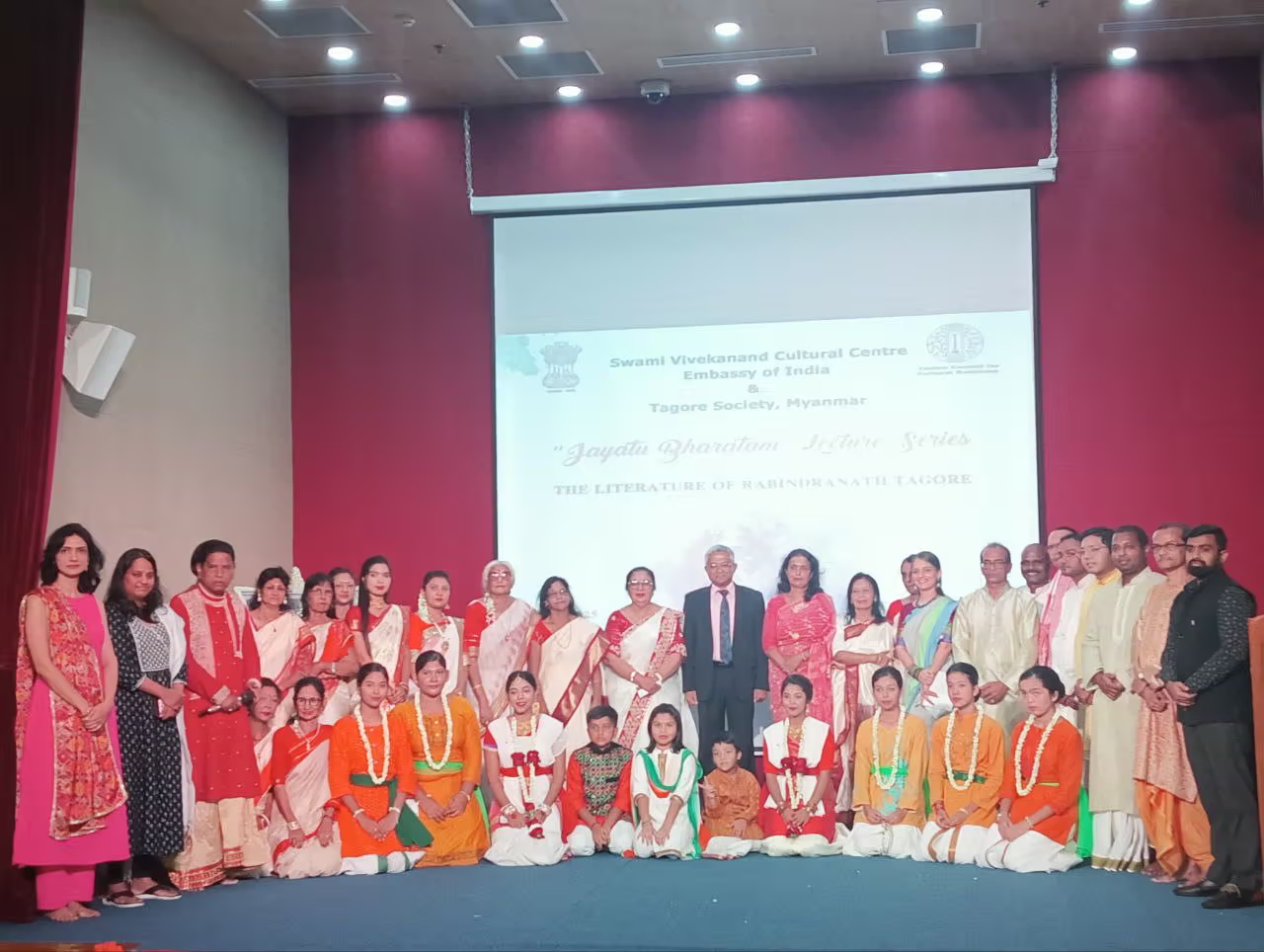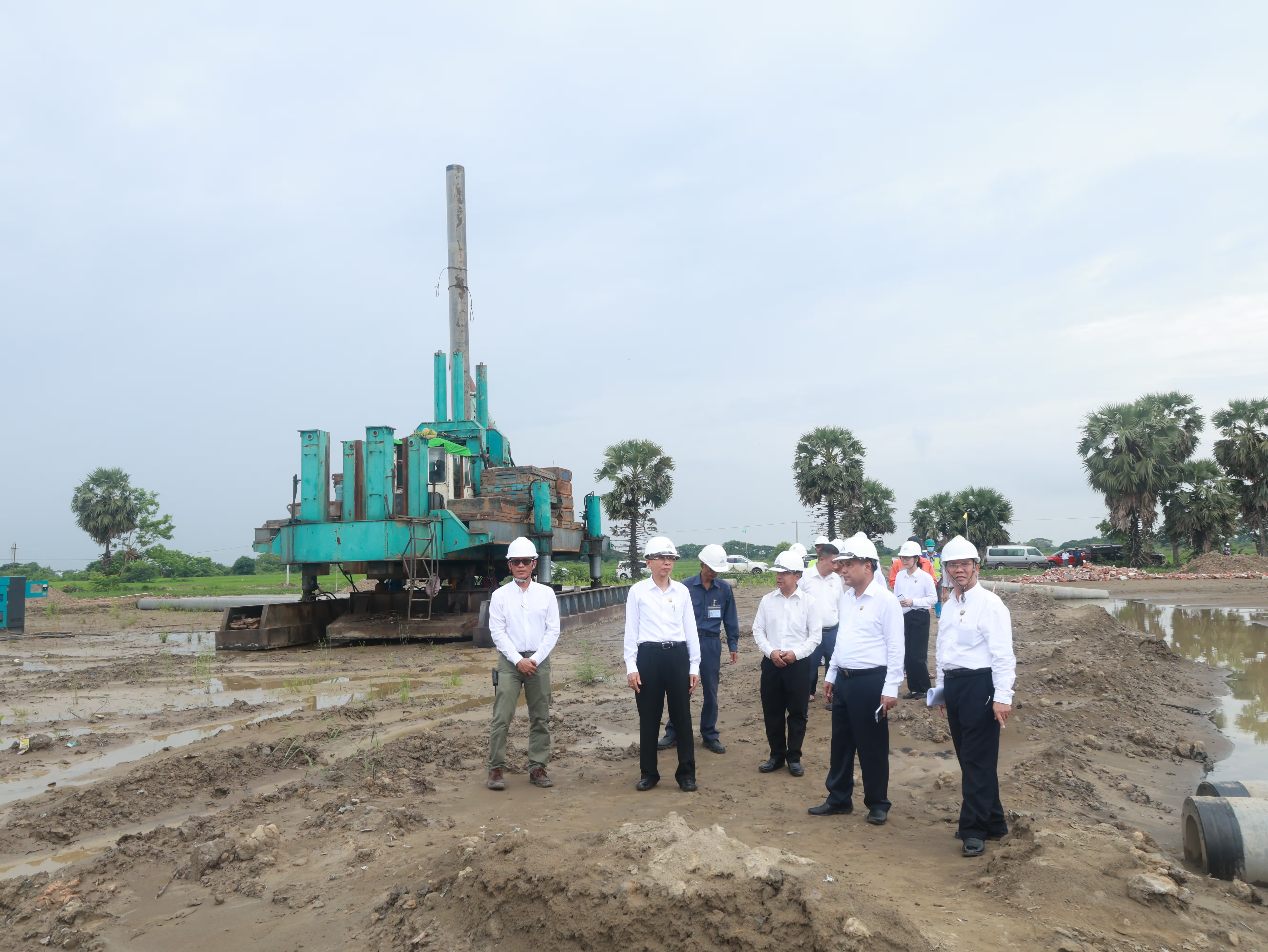
Nay Pyi Taw, June 7, 2025- Myanmar's Ministry of Energy is aiming to begin operations of a new oil refinery capable of processing 500,000 tons of crude oil annually by the end of this year, according to Union Minister U Ko Ko Lwin.
During his visit to the No. (1) Thanlyin Refinery on June 6, the Minister stated that the plant will be relaunched with a modernized structure under a modular refinery model. Phase 1 of the project targets an annual refining capacity of 500,000 tons of crude oil, while Phase 2 will scale up operations to a capacity of 3 million tons per year.
The refinery, currently under construction, is expected to begin production by the end of 2025. The ministry also announced plans to complete a second, larger refinery with a 3-million-ton annual capacity by 2028.
In addition, the Magway Region-based Than Payar Kan Petrochemical Complex is undergoing an upgrade to enable the production of higher-grade fuel oils.
"Once the projects are completed, Myanmar will be able to fully meet its domestic fuel demand, reduce reliance on foreign currency, and overcome past fuel shortages. This will also support an increase in national productivity," Minister U Ko Ko Lwin stated.

The fuels produced by the new refinery are expected to meet Euro 4 standards. For gasoline, the minimum octane number will be 92, according to information from the Ministry of Energy.
During the site inspection, the Minister reviewed ongoing work including pile foundation activities at the refinery construction site, installation of the Thanlyin natural gas regulating and distribution station, and planning for pipeline routes to transport crude oil and petroleum products. He also inspected the horizontal directional drilling (HDD) work under the Bago River for the gas pipeline between South Dagon and Thanlyin.
Myanmar has long relied heavily on fuel imports, causing vulnerability in fuel access. This project is part of the government’s strategic energy security plan to produce fuel domestically and reduce dependency on foreign supply.
#ymg/knl
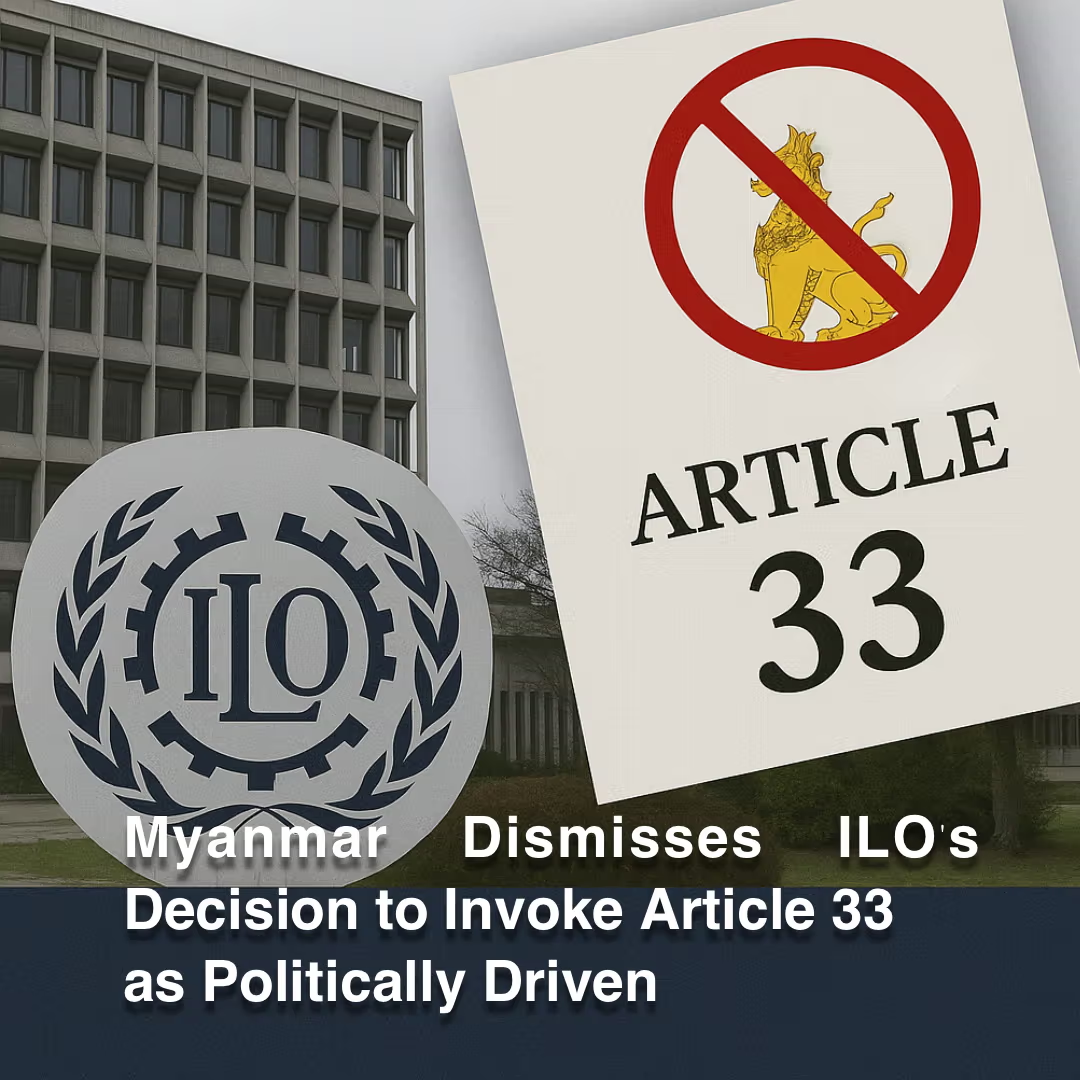
NAY PYI TAW, June 6, 2025 —The State Administration Council (SAC) of Myanmar has publicly dismissed the significance of the International Labour Organization (ILO)’s decision to invoke Article 33 against Myanmar, stating that local businesses, employers, and workers should continue operations "peacefully and without concern."
The response comes after the ILO’s 113th International Labour Conference, held on June 5, 2025, where the organization officially adopted Article 33 measures against Myanmar for failing to implement recommendations from a previous Commission of Inquiry regarding forced labour and trade union suppression.
“The ILO’s decision is politically motivated and intended to pressure Myanmar’s sovereignty,” the Ministry of Labour of Myanmar stated. “It will not have any direct impact on domestic employers, workers, or the country’s economic operations.”
According to the ministry's statement, the ILO resolution was influenced by one-sided demands aimed at applying international pressure through institutional channels. It rejected the legitimacy of the resolution, framing it as a political tool rather than a genuine labour-related action.
Despite the ILO’s move, the ministry emphasized that Myanmar will continue cooperating with international organizations, including the ILO, to support the development of labour rights, employment opportunities, and social welfare—provided that such cooperation does not infringe upon Myanmar’s sovereignty and independence.
The ministry reiterated its commitment to improving labour conditions under national laws and to engaging with global partners while safeguarding national interests.
Under Article 33 of the ILO Constitution, if a member state fails to comply with the recommendations of a Commission of Inquiry under Article 26, the ILO’s Governing Body may recommend collective action through the International Labour Conference to compel compliance.
This marks the second time in history that Article 33 has been invoked against Myanmar, following a similar action in 2000 for forced labour violations.
#ymg/knl

WASHINGTON, D.C., June 6, 2025 —– The United States government has officially suspended all visa entries for citizens of Myanmar, effectively barring them from entering the country either as immigrants or non-immigrants. The decision was announced by the White House on June 6, 2025, and came into effect immediately following a proclamation signed by President Donald Trump.
According to the proclamation, the suspension applies to all categories of Myanmar nationals seeking entry into the United States, citing high overstay rates as the primary reason. The document reveals that 27.07 percent of Myanmar citizens who were issued B‑1/B-2 visas—typically used for business and tourism purposes—were found to have overstayed their authorized period of stay. This implies that out of every 100 Myanmar nationals holding such visas, approximately 27 remained in the U.S. unlawfully beyond their visa expiration.
In addition to this, the overstay rate among Myanmar nationals who entered the United States on F, M, and J visas was recorded at an even higher level—42.17 percent. These visa categories are generally issued to academic students (F), vocational students (M), and exchange program participants (J), including their family members. The figures indicate that out of every 100 visa holders in these groups, roughly 42 failed to leave the United States within their permitted stay.
The presidential proclamation emphasized that such high violation rates undermined the integrity of the U.S. immigration system and necessitated immediate remedial action. As a result, Myanmar has now been added to a list of countries subject to full visa entry suspension.
Myanmar joins eleven other countries that have also been placed under complete visa bans. These countries include Afghanistan, Chad, the Democratic Republic of the Congo, Equatorial Guinea, Eritrea, Haiti, Iran, Libya, Somalia, Sudan, and Yemen.
In addition to these, the United States has imposed partial visa restrictions on seven other countries: Burundi, Cuba, Laos, Sierra Leone, Togo, Turkmenistan, and Venezuela. Citizens of these countries face more limited or conditional entry into the United States, depending on the visa type and specific circumstances.
The new immigration restrictions mark one of the most sweeping visa policy shifts in recent years and are expected to impact thousands of applicants from the affected countries.
#knl/ymg
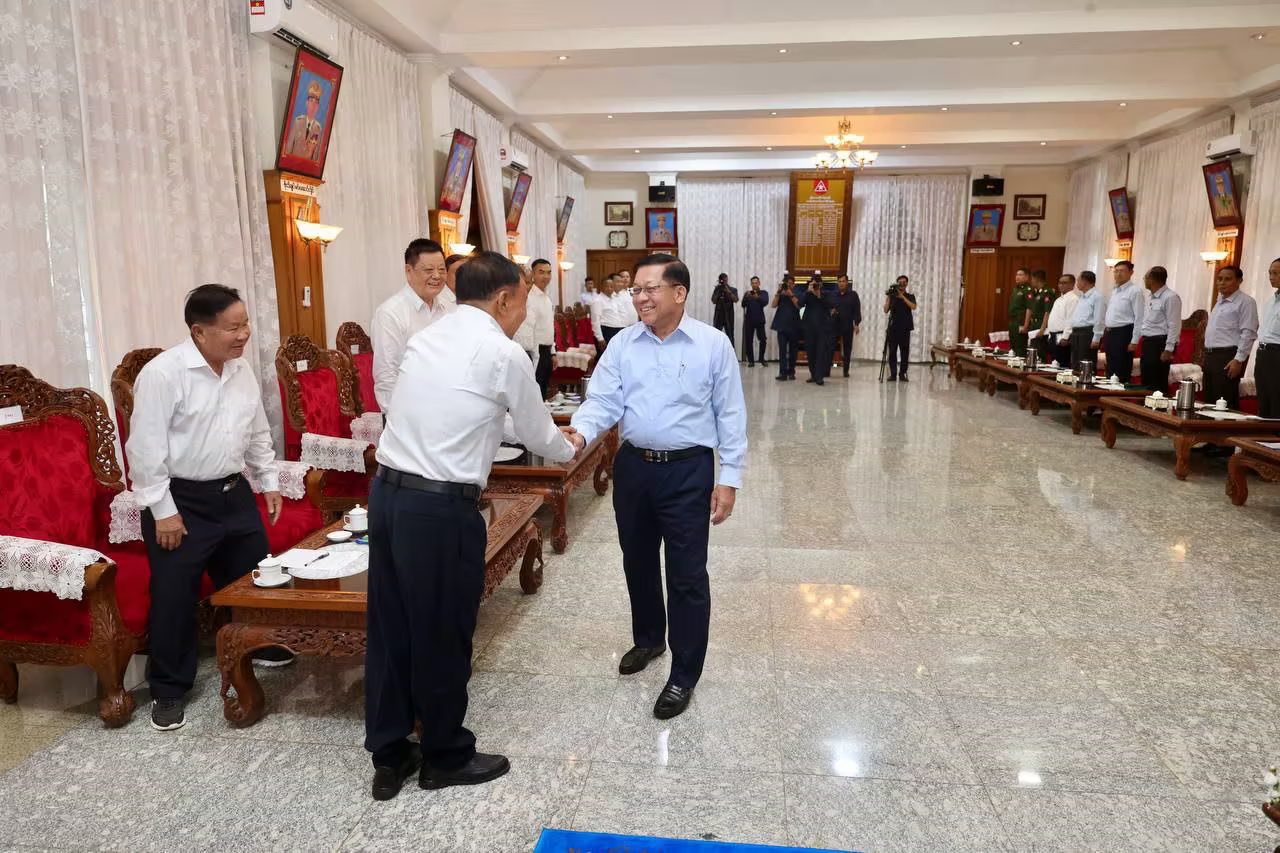
Tachileik, 25 May 2025 —U San Pae, Deputy Chair of the National Democratic Alliance Army (NDAA-Mongla), has affirmed that no armed groups or political organizations are accepted within NDAA-controlled territory. He conveyed this position during a meeting with Senior General Min Aung Hlaing, Chairman of Myanmar's ruling State Administration Council and Prime Minister of Myanmar.
The meeting took place at the Golden Triangle State Guesthouse, located within the Triangle Region Command. U San Pae led the NDAA Peace and Unity Committee delegation, which held discussions on strengthening cooperation in peacebuilding, regional stability, and national development.
U San Pae reiterated that the NDAA remains steadfast in upholding the three national causes: non-disintegration of the Union, perpetuation of national sovereignty, and the preservation of ethnic solidarity—principles the organization has adhered to for over three decades.
Senior General Min Aung Hlaing emphasized that Myanmar is a Union nation built upon a genuine multi-party democratic system and a federal framework. He called on all ethnic nationalities to unite in advancing the country's long-term interests.
He further underscored the importance of achieving nationwide proficiency in the official Union language and literature, stating that a consistent, Union-wide education system aligned with federal principles must be implemented across the country.
According to a press release from the State Administration Council, both sides engaged in open and constructive discussions covering peace, education, healthcare, and socio-economic development.
In attendance alongside Senior General Min Aung Hlaing were Council Joint Secretary General Ye Win Oo, Chief of the General Staff (Army, Navy, and Air Force) General Kyaw Swar Lin, and senior officials from the Office of the Commander-in-Chief. Representing the NDAA were Deputy Chairs U San Pae and U San Lu, U Kyi Myint, and other senior members of the NDAA Peace and Unity Committee.
#ymg/knl
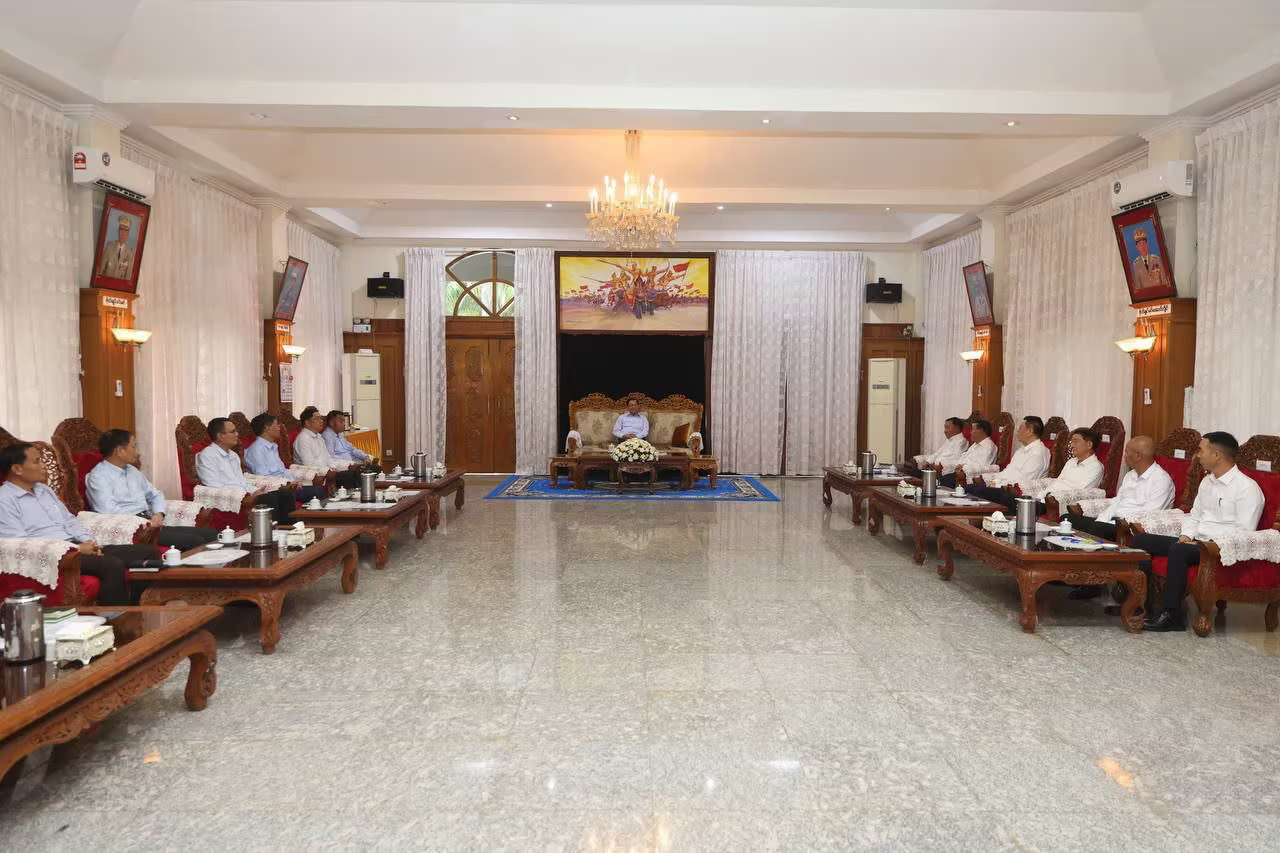

The big picture:
Bangladesh's fragile transition is under threat as a growing rift between interim leader Muhammad Yunus and Army Chief General Waker-Uz-Zaman fuels fears of a political breakdown—or worse.
🔥 What's happening
Yunus under pressure: The Nobel laureate has faced mounting calls to resign amid stalled reforms, opposition protests, and military demands for elections by December 2025.
Army's hard line: General Waker-Uz-Zaman insists polls must be held this year, clashing with Yunus’ plan to delay until mid-2026 to complete constitutional reforms.
Emergency talks: Yunus convened a closed-door meeting on May 24 to reaffirm his leadership after speculation of his resignation. Advisers say he will stay on—for now.
⚠️ Why it matters
Coup fears rise: The standoff evokes memories of Bangladesh’s 2007 military-backed caretaker government. Yunus’ aides warn of a “return to authoritarianism” if unity fails.
Crackdown intensifies: The government’s “Operation Devil Hunt” has arrested over 11,000 people since February, targeting Awami League loyalists and fueling accusations of political repression.
Opposition unrest: The Bangladesh Nationalist Party (BNP) and student-led National Citizen Party (NCP) are demanding early elections and the removal of military influence from politics.
🧠 What to watch
Leadership showdown: Yunus is set to meet opposition leaders this week to defuse tensions. But without a clear election timeline, political paralysis could deepen.
Military maneuvering: Reports suggest Yunus may be backing a rival general to replace Zaman, raising the stakes in the civil-military power struggle.
Public response: With memories of past military interventions still fresh, public sentiment could sway the outcome of this political crisis.
🧾 The bottom line
Bangladesh’s democratic transition is at a crossroads. Without compromise between Yunus and the military, the country risks slipping back into authoritarian rule or facing another period of instability.
Source: Reuters, Times of India, Arab News, Wikipedia
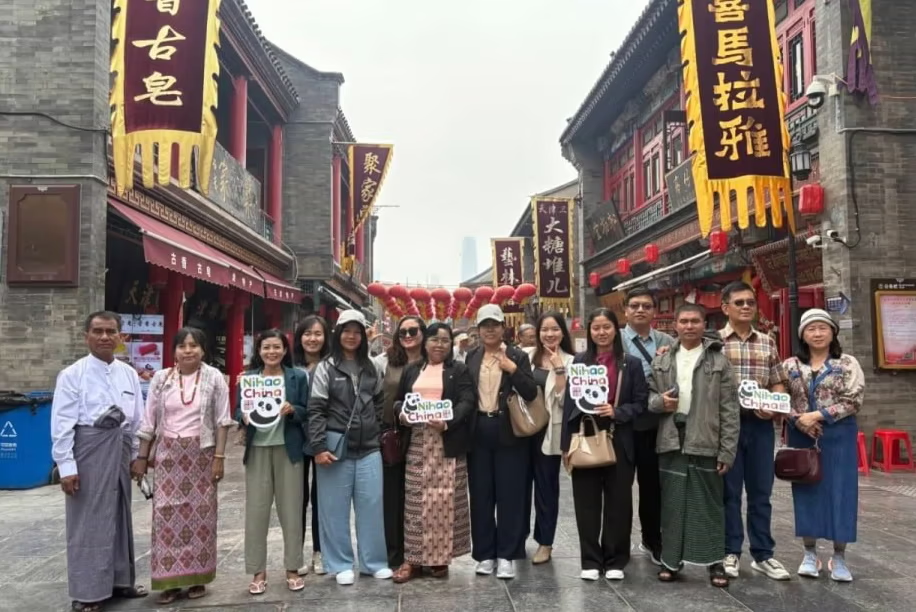
Nay Pyi Taw, May 25— In commemoration of the 75th anniversary of the establishment of diplomatic relations between Myanmar and China, and with the aim of enhancing bilateral educational exchanges, a delegation of basic education school principals from Myanmar visited Beijing and Tianjin, China, from May 19 to 23, according to a statement from the Chinese Embassy in Myanmar.
The 14-member delegation included representatives from the Ministry of Education and both public and private schools across the Union Territory of Nay Pyi Taw, Yangon and Mandalay Regions, Shan and Kayin States, and Ayeyarwady Region. The visit was organized and facilitated by the Chinese Embassy in Myanmar.
During their stay in Beijing, the delegation visited cultural and historical landmarks such as the Great Wall, Tiananmen Square, and Lingguang Temple. They also toured international schools and relevant educational and cultural institutions to gain firsthand insights.
The delegation then traveled to Tianjin via the Beijing-Tianjin high-speed railway, where they visited notable sites including the Ancient Culture Street and the Porcelain House (China House). They also visited the Sino-German Vocational and Technical College in Tianjin, where they engaged in study tours and workshops.
During the discussions, participants exchanged views on topics including the enhancement of national education quality, Chinese language teaching abroad, and vocational education development in developing countries. The two sides also shared practical teaching experiences, the embassy stated.
#ymg/knk
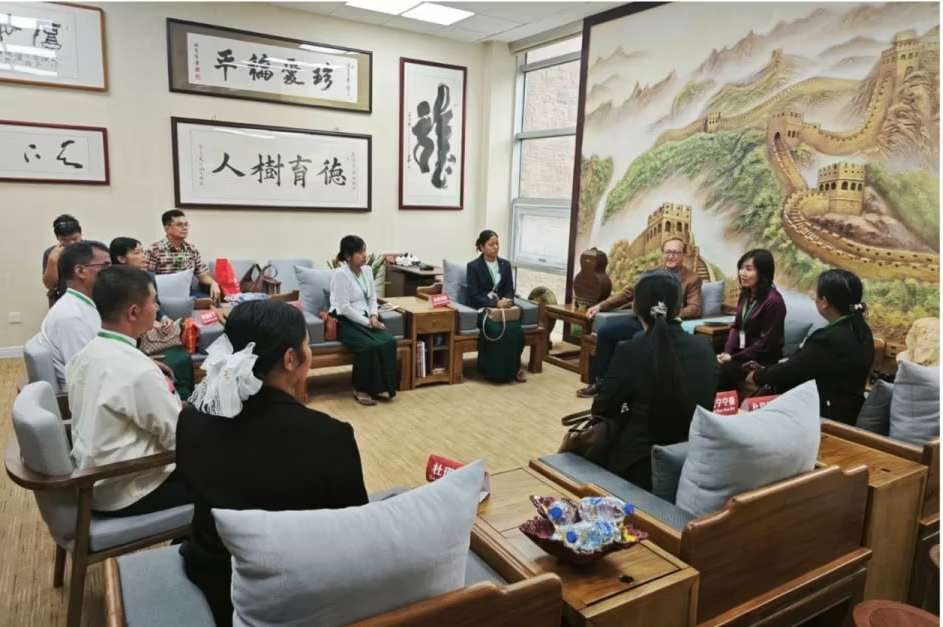
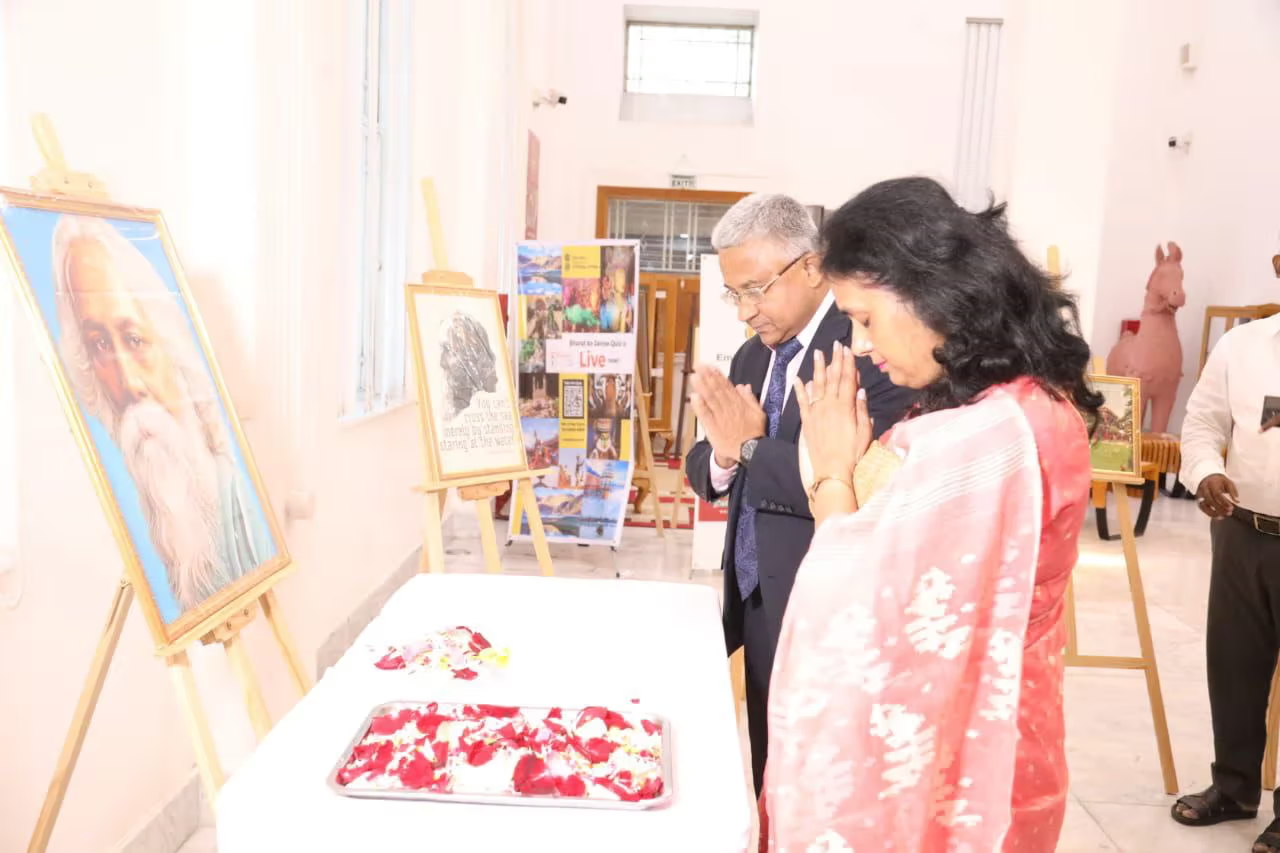
YANGON, 23 May 2025 - India’s humanitarian response during Myanmar’s recent major earthquake exemplified the compassion and solidarity envisioned by renowned Indian poet and philosopher Rabindranath Tagore, Indian Ambassador to Myanmar H.E. Abhay Thakur said today.
Speaking at a literary event in Yangon, Ambassador Thakur praised the swift and heartfelt support provided by the Government of India, the Indian diaspora, and affiliated networks during the natural disaster. He described the relief efforts as “an embodiment of Tagore’s vision of universal humanism.”
The remarks were delivered at a special lecture on Tagore’s literary and artistic legacy, part of the Lecture of the Jayatu Bharatam series. The event was co-hosted by the Swami Vivekananda Cultural Centre of the Indian Embassy and the Tagore Society of Myanmar.
“Many of Tagore’s poems and essays have been translated into the Myanmar language, and his ideas have deeply resonated with Myanmar’s intellectuals. His Nobel Prize-winning poetry collection Gitanjali has become the spiritual voice of India. That voice still echoes today, here in Yangon,” Ambassador Thakur noted.
He recalled that Tagore visited Yangon three times – in 1916, 1924, and 1927 – and emphasized that the visits were more than ceremonial. “They were efforts to deepen cultural and spiritual dialogue between India and Myanmar,” he said.
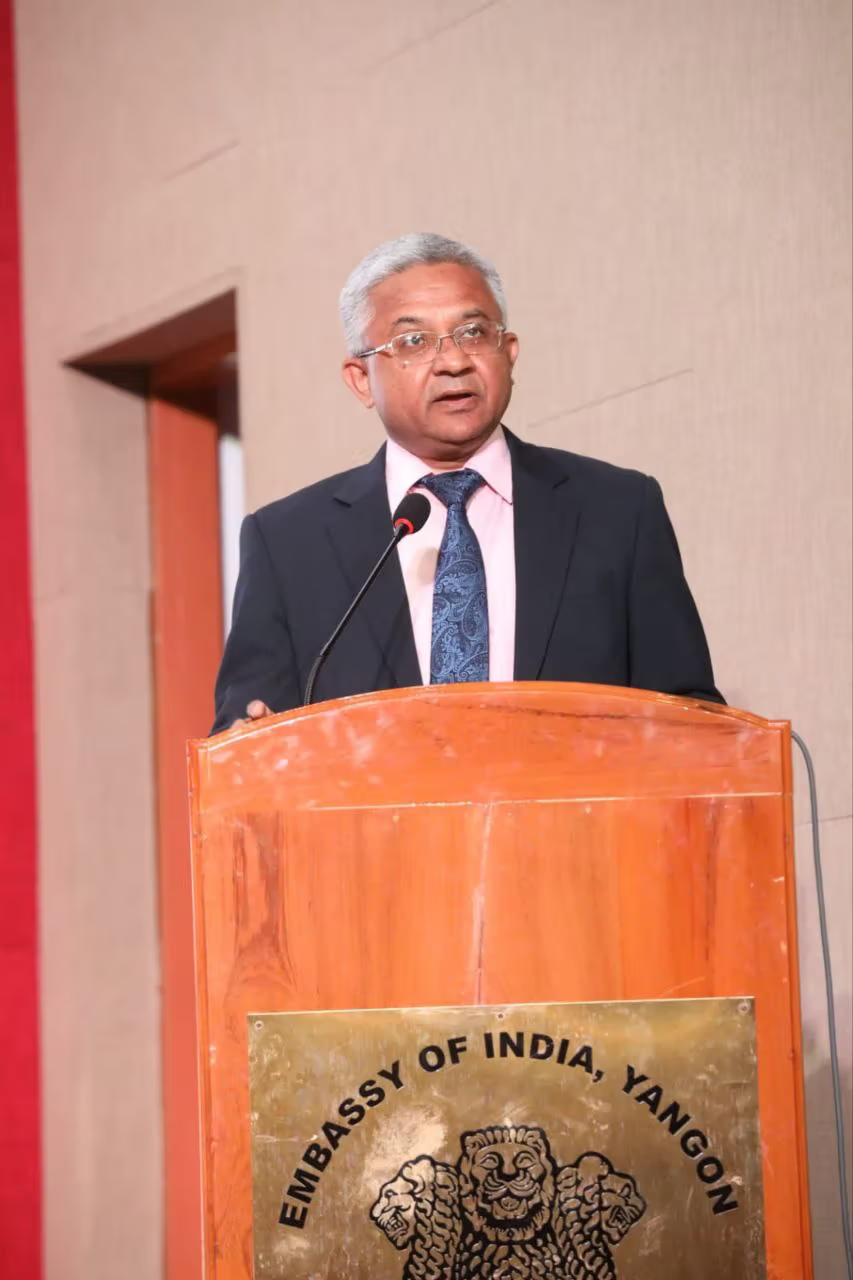
“His journeys forged enduring spiritual connections, particularly among followers of the Buddha in Myanmar. In his speeches, he highlighted how ancient civilizations like India and Myanmar are intrinsically connected in their spiritual essence,” the Ambassador added.
Ambassador Thakur underscored that India and Myanmar are not only geographic neighbors but are bound by strong cultural ties and familial bonds. “We are trusted friends who stand by each other in all circumstances,” he said.
The event was attended by officials from the Indian Embassy, representatives of the Tagore Society Myanmar, senior members of the All Myanmar Hindu Central Council, delegates from India-Myanmar friendship organizations, community leaders, and members of the media.
#ymg/knl
